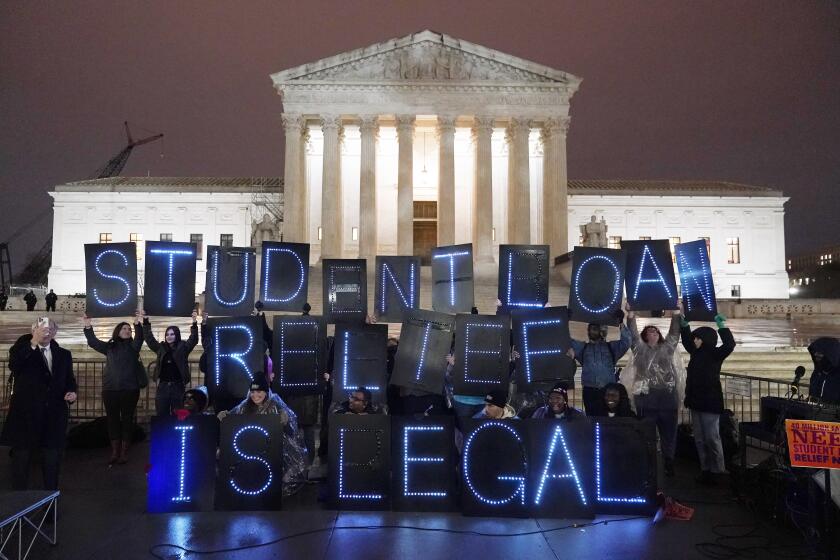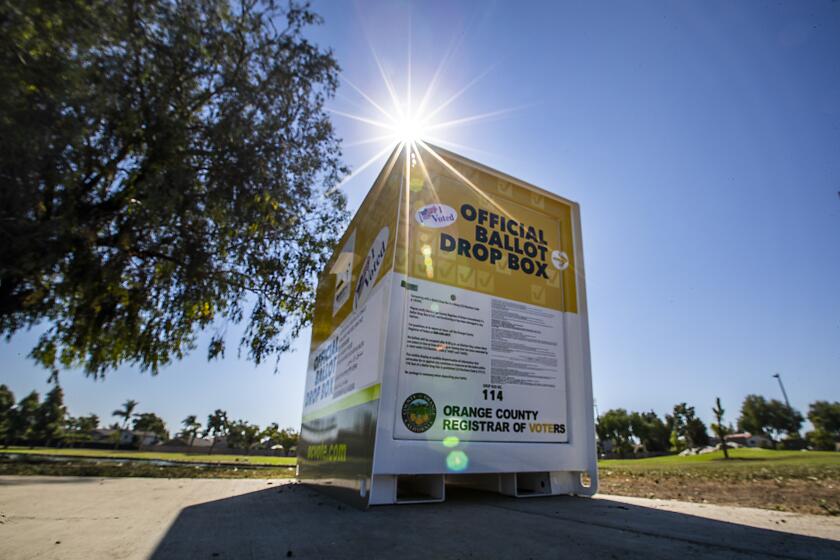‘Megan’s Law’ Extended to Campuses
To Sally Miller, community colleges are a great place. They take all comers. They help all sorts of people make something of themselves. They give others a second chance to turn their lives around.
But as a badge-carrying detective on community college campuses in Sonoma County, Miller was deeply disturbed by one fact: Colleges and universities were one place where serious sex offenders could avoid being publicly identified by “Megan’s Law” public disclosures.
Not for long.
After years of lobbying, Miller’s quiet crusade has changed the law of the land.
President Clinton recently signed a new law with a tiny provision tucked deep inside that will require all serious sexual offenders to report if they are enrolled at specific colleges or have jobs or carry on vocations--such as lay minister or volunteer coach--on college campuses.
All colleges, in turn, will have to inform the public by October 2002 how to obtain such information.
Miller said the change in the law will be embraced by campus police who oversee what she calls “safe havens” for sexual predators. “It’s a place where they can literally hide from the law,” the detective said. “A college student would have no way to know she is sitting next to a rapist in class.”
So does this mean that the dorms are shelters for sexual predators? Hardly.
The number of sexual offenders subject to Megan’s Law on traditional college campuses is minuscule. In fact, any serious sex offender who resides in the dorms already must register with local authorities under laws that require them to report their residences.
But the new law could have a particular impact at community colleges, which have nothing but commuters and a very different mix of students than traditional four-year colleges and universities.
Prestigious universities have rigorous admission standards limiting enrollment to the best and the brightest. Community colleges have no such admissions rules. They accept anyone, including those who enroll under a judge’s order.
“Convicted felons are often ordered by the courts to attend the community college to learn social and work skills,” Miller said. “We’re part of transitional programs for many different types of people.”
That’s precisely why the ACLU and other civil liberties groups have opposed special reporting requirements for college students. Why, they ask, should the law stigmatize people who have paid their debt to society and are taking steps to better themselves by going to college?
Michael J. Dear, director of USC’s Southern California Studies Center, fears that the new law will “encourage vigilante activities in fragile campus communities,” just as has happened in some small towns.
“Given the sensitivity of young people living away from home for the first time, it could be a very disturbing development,” he said. “There are better ways to handle this.”
California, like other states, has until 2002 to work out the details of how it will implement the new federal law.
Congress backed away from an earlier bill, which would have required each college or university to collect and maintain data on any student with a history of a sex crime. Instead, it left such decisions up to each state.
Assembly members Patricia Bates (R-Laguna Niguel) and Anthony Pescetti (R--Rancho Cordova) have reintroduced a bill that would require all sex offenders to register with University of California, Cal State or community college police within five days of enrollment.
The language of the bill, which has been scuttled twice before by opponents, is likely to change as lawmakers work out the details, Pescetti said. But he believes it will sail through this time, given that the federal government could withhold millions of dollars from any state found in noncompliance.
“We feel that, for the safety of the students and children in campus day- care [centers], we want them to register,” he said.
Francisco Lobaco, the ACLU’s California legislative director, said sex offenders already must register every year for life with local authorities concerning their residences. He worries that some will be caught off guard by a second reporting requirement when enrolling in a night course on computer programming. Failure to register is a felony, punishable by as much as three years in prison.
“We will take a very close look at anything this Legislature does to implement this new law,” Lobaco said, “to make sure it doesn’t punish people with dual registration requirements.”
More to Read
Sign up for Essential California
The most important California stories and recommendations in your inbox every morning.
You may occasionally receive promotional content from the Los Angeles Times.






